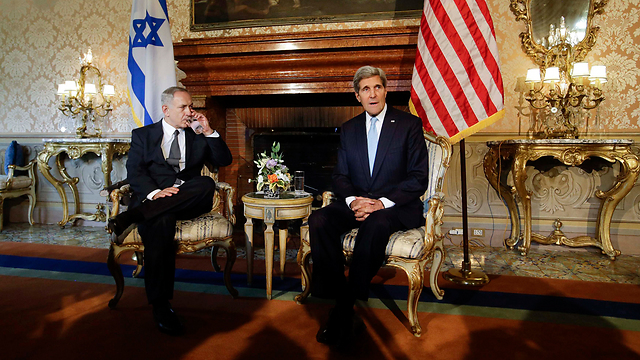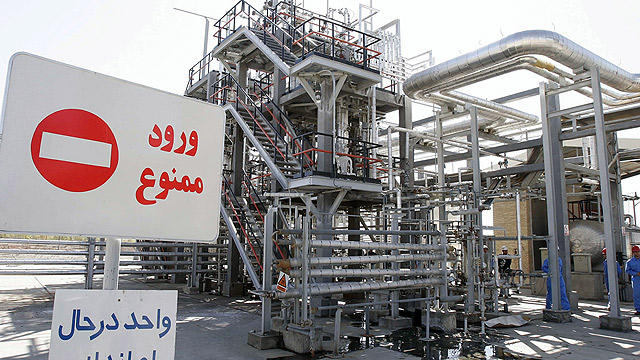Prime Minister Benjamin Netanyahu said the world should not accept what he called a "partial deal" to curb Iran's nuclear program - just as it would not have allowed the Syrian government to keep any of its chemical weapons stockpile.
Netanyahu told America's chief diplomat that ongoing negotiations with Iran should insist that Tehran end all enrichment on uranium, get rid of any fissile material and close water plants and underground bunkers that he said are only necessary to build a nuclear bomb.
"I think a partial deal that leaves Iran with these capabilities is a bad deal," Netanyahu told US Secretary of State John Kerry at the start of what was expected to be a daylong private meeting in Rome.
"You wisely insisted there wouldn't be a partial deal with Syria," Netanyahu said. "You were right. If (Syrian President Bashar) Assad had said, 'I'd like to keep 20%, 50%, or 80% of my chemical weapons capability,' you would have refused - and correctly so."
Still, Netanyahu predicted that "we're very close" to striking a deal with Iran. "And I agree with you that the goal is to get it peacefully," he said.
"Iran must not have a nuclear weapons capability, which means that they shouldn't have centrifuges (for) enrichment, they shouldn't have a plutonium heavy-water plant, which is used only for nuclear weapons," Netanyahu told reporters before the meeting.
Related stories:
- 'Turkey disclosed to Iran identities of Israel spies'
- Op-ed: Iran has no one to fear
- Analysis: Iran's strategic landmine
"They should get rid of (their amassed) fissile material, and they shouldn't have underground nuclear facilities, (which are) underground for one reason - for military purposes," the Israeli leader said. He called Iran's program the region's foremost security problem.
Iran says it is enriching uranium solely for electricity and medical treatments, not nuclear weapons.
Kerry, whose aides are exploring a diplomatic solution to rein in Iranian nuclear activity, took a tack different from Netanyahu by suggesting Iran could show its program was peaceful by adhering to international standards followed by other nations.
"We will pursue a diplomatic initiative but with eyes wide open, aware that it will be vital for Iran to live up to the standards that other nations that have nuclear programs live up to as they prove that those programs are indeed peaceful," Kerry said as he and Netanyahu began a meeting at the US ambassador's residence in the Italian capital.
"We will need to know that actions are being taken which make it crystal clear, undeniably clear, fail-safe to the world that whatever program is pursued is indeed a peaceful program," he told reporters.
Netanyahu, Kerry meet in Rome (Video: Reuters)
"No deal is better than a bad deal," Kerry said. "But if this can be solved satisfactorily, diplomatically, it is clearly better for everyone, and we are looking for an opportunity to be able to that."
Six global powers held talks with Iran last week in Geneva to test whether a diplomatic resolution might be reached, their first such negotiations since moderate Iranian President Hassan Rohani's election in June opened up possibilities for a deal after years of increasing confrontation.
A second round of these talks, which include Britain, China, France, Germany, Russia and the United States, is scheduled for early November, also in Geneva.
Iran cites a right to refine uranium for peaceful purposes under the nuclear Non-Proliferation Treaty (NPT), a 1970 global pact to prevent the spread of nuclear arms.
But the United States has said Iran does not automatically have this right under international law because, it argues, Tehran is in violation of its obligations under counter-proliferation safeguards.
A series of UN Security Council resolutions since 2006 has demanded that Iran suspend all enrichment and heavy water related activities.
But Western experts say, and some diplomats privately acknowledge, that it is no longer realistic to expect Iran to halt all its enrichment, as the Islamic state has sharply expanded this work in the last seven years and it is seen as a source of national pride and prestige.
Instead, they say, any deal should set strict, verifiable limits on the number of centrifuges that Iran can have and on the production of low-enriched uranium.
Netanyahu also addressed the Israeli-Palestinian talks, saying "peace is premised on mutual recognition of two states for two peoples – the Palestinian state for the Palestinian people mirrored by the Jewish state for the Jewish people. I think that’s fundamental for any peace, but equally it must be a peace that – as President (Barack) Obama has said – a peace that Israel can defend by itself, for itself against any conceivable threat. I think these are the two twin pillars of peace."
Reuters and AP contributed to the report
- Receive Ynetnews updates
directly to your desktop

















